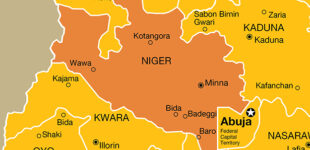Nigeria acquires cosmic ray muon detector to aid climate prediction

The National Space Research and Development Agency (NASRDA) says Nigeria has acquired a cosmic ray muon detector to aid climate change and atmospheric research.
A cosmic ray muon detector (CRMD) is a particle detector which can detect and observe by-products of cosmic ray particles which were created and accelerated by very violent mechanisms in the universe.
Babatunde Rabiu, director of the UN-African Regional Centre for Space Science and Technology Education in English (UN-ARCSSTEE), announced the acquisition at a symposium on Friday in Abuja.
He said the muon detector was built and designed by the physics and astronomy department of Georgia State University (GSU).
Rabiu said cosmic rays are useful in studying the climate because they are natural radiations that are not ionised in the atmosphere and vary in location, latitude, and altitude — and can be modified when certain anthropogenic activities occur.
“More than ever, scientists are curious about predicting weather, and studying space weather, especially now that climate change is becoming obvious, which is the condition in outer space,” Rabiu said.
“Cosmic rays are everywhere and it has to do with the earth, and it is useful in studying the climate but is yet to be fully impacted because it is ongoing research.
“That is why we hope that with the measurements we are taking with the muon detector, we will be able to have effective predictability of our climate system.”
Rabiu said Africa needs more monitoring systems for space weather, adding that only a few countries have global navigation satellite system (GNSS) receivers.
He Xiaochun, director of physics at GSU, said the project was targeted at exploring living in space, understanding it, and its adaptation, and providing information for stakeholders to make informed decisions.
Xiaochun said cosmic ray radiation, mostly proton particles, is produced far in deep space and gets into the solar system and produces cosmic ray showers in the earth’s upper atmosphere.
“We measure the shower particles at the surface of the earth and decode the state of the space and earth weather,” he said.
“One needs a network IP address to be able to share data and reconfigure the detector with remote access.”
Bonaventure Okere, director of the Centre for Basic Space Science and Astronomy, said the cosmic ray muon detector would aid astronomy studies and enhance research and development.











There are no comments at the moment, do you want to add one?
Write a comment